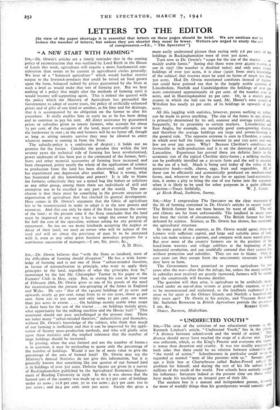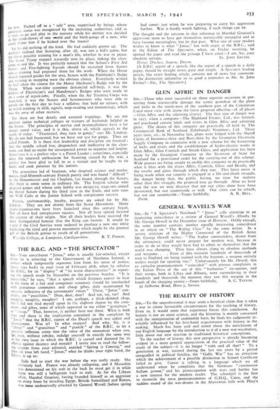"UNDIRECTED YOUTH"
Sm,—The crux of the criticism of our educational system in Mr. Kenneth Lindsay's article, "Undirected Youth," lies in the phrase. "A divorce between school-work and the world of action." Tin divorce should never have reached the stage of a decree nisi. That was collusion, which, as the King's Proctor and everyone else knows. is worse than desertion and cruelty. It was too readily assumed on both sides that there could be no relation between school-life and "the world of action." Schoolmasters in particular could never be regarded as normal "men of like passions with us." Sevent Years ago a little boy at C.harterhouse called Baden-Powell solved the problem for himself, and during the rest of his life solved it for millions of the youth of the world. Few schools have entirely escaped his influence: fortunate indeed at the present time are those whici have made his teachings an integral part of their life. The modern boy is a mature and independent - person, knowing, far more of worldly things than his grandparents would consider go°' for him. Packed off to a " safe " area, supervised by beings whose unnatural status was recognised by the recruiting authorities, told as it were to go and play in the nursery while his destiny was decided in the death-throes of one world and the birth-pangs of a new, who could blame him if he kicked over the traces?
• Yet he did nothing of the kind. He had suddenly grown up. The doubters realised that Scouting, after all, was not a kid's game, but the finest possible training for a man's life, whether in war or peace. The Scout Troop stepped naturally into its place, linking the class- room to real life. It was perfectly natural that the School's First Aid Parties and Fire-fighting Squads should be recruited from Scouts whoi,e training had prepared them for the work. When the Home Guard required guides for the area, Scouts with the Pathfinder's Badge and training in mapping were the obvious choice. Everybody wished he had taken the course for the Motor Mechanic's Badge run by the Troop. When war-time economy demanded self-help, it was the holders of Electrician's and Handyman's Badges who were ready to do a score of repair-jobs. Finally, when the Air Training Corps was launched, it was the Scouts and Scoutmasters who were able to parade on the first day to face a syllabus that held no terrors, with an initial training in drill, signals, map-reading and meteorology, which was the envy of other recruits.
Yet these are but details and external trappings. We are not amateur junior technical colleges or trainers of husbands helpful in the house. The principles of service and resourcefulness have a far deeper moral value, and it is this, above all, which appeals to the youth of today. "Frustrated, they turn to gangs," says Mr. Lindsay. We do not feel frustrated, but we have our use for gangs. They are called Patrols. It is there that leadership and discipline are fostered ; that the middle school boy, despondent and ineffective in the class- room, can find an outlet for unsuspected power to organise and inspire. Seine:laws it is a prefect who is a Patrol Leader ; sometimes, especially since the renewed enthusiasm for Scouting caused by the war, a prefect has been glad to fall in as a recruit and be taught to tie knots and cook potatoes by his juniors.
The precocious lad of fourteen, who despised science and mathe- matics, read fifteenth-century French poetry and was found " difficult " by the Housemaster and the Chaplain, has found, through the Scouts, that there is some sense in ordinary life. The English scholar who despised games and whose only hobby was designing stage-sets joined the Rover Scouts during his third year in the Sixth, and now runs the Wolf Cubs at the Junior School with conspicuous success.
Fitness, craftsmanship, loyalty, purpose are asked for by Mr. Lindsay. They are not absent from the Scout Movement. Many youth-organisations have been launched since this century began. Not all have had conspicuous success. Not all have spread beyond the country of their origin. Not all their leaders have received the most distinguished honour that the King can bestow. It would be a pity if the Civil Service were ordered to produce a new one while neglecting the tried and proven movement which might be the greatest gift of the British genius to youth of all generations.
Wycli fie College, at Lam peter, Cardiganshire. B. T. PARKIN.































 Previous page
Previous page